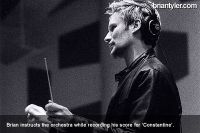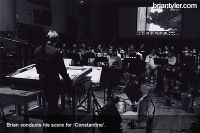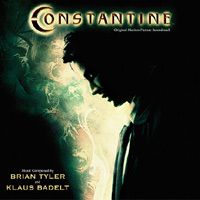Anyone who  reads a review about Brian Tyler's soundtrack in this site could see immediately he is our favorite composer. Several are the reasons: we are charmed with his music, he was the first one that granted us an interview, he is very friendly and he will attend our I International Conference on Movie Music Ciudad de Úbeda. It is enough, isn't it? reads a review about Brian Tyler's soundtrack in this site could see immediately he is our favorite composer. Several are the reasons: we are charmed with his music, he was the first one that granted us an interview, he is very friendly and he will attend our I International Conference on Movie Music Ciudad de Úbeda. It is enough, isn't it?
"Constantine" is his latest work and Brian has revealed us a lot of details.
Thank you very much, Brian: Now the fans we will have many more questions for you in the Conference!
Madrid, March the 8th 2005 21:30 (local time)
BSOSpirit (BS): Could I speak to Mr. Tyler, please?
Brian Tyler (BT): Hello, this is Brian.
BS: Hello Brian! I'm José Luis Díez-Chellini from BSOSpirit.com. How are you?
BT: Yes, good. How are you doing?
BS: Very good. Do you remember we have the Constantine interview today? Are you ready to start it?
BT: Sure.
BS: Great!
BS: The first question. Have you read some "Hellblazer's" comic?
BT: Oh, yes I have! But, in fact, the first time I didn't realize that Constantine was a movie about Hellblazer, when I heard of the film from the producer. He talked about a movie called Constantine, and I didn't realize that it was about Hellblazer.
BS: What did you like more of this project?
BT: I enjoyed exploring the balance between the dark and the light, Heaven and Hell, and thematically the main character that settles somewhere between the dark and the light. It is musically an interesting place to compose.
BS: Your  score is neither not epic at all nor excessive; rather it stops in the incidental thing and in slightly melodic sounds. Is it something meaningful or is some imposition of the director? score is neither not epic at all nor excessive; rather it stops in the incidental thing and in slightly melodic sounds. Is it something meaningful or is some imposition of the director?
BT: The director and I from early on in talk about the score needed to support all the characters thematically, to give a sense of the great area, the great moral epic that the main character had. The idea was not to go too epic or large or sweeping. The character is more heroic like a superman or some other comic character. And this is one of those characters also from the comic, typically heroic. We associated perhaps a more epic sound with a more heroic character. And that's in it, but the tempo was to look more at a film on the war, and look at sounds like "The Maltese Falcon" and "Chinatown", and movies where the viewer and the entitlement about the character, and we listen about this sound of music with jazz influences..., a cynical type of approach, not musically but it reflects the cynical approach of John Constantine, the character. So the sound was a little bit more contained. The one thing that I did focus on was to use ancient musical language, much more ancient that what you would normally associate with Hell-fire musiclike "Carmina Burana" type. I did not want to do that. I did it, instead, looking up more on early Sephardic music. Very much like ancient melodies that didn't have the type of epic that surround thematic melodies, more prone to folk melodies... I don't know which style is this.
BS: A few months ago, during the recording of "Constantine", Sergio Benitez spoke with you representing BSOSpirit and he detected your enthusiasm with this score. You said to him that it's the best one that you have done in your entire career. Do you continue thinking it?
BT: Good question. For me, every time that I do a new score I feel that a certain part of me as a composer grows and learns something. Invariably, evidently I feel that really each one is stronger than the previous one perhaps. But, at the same time, many of the scores are incomparable to each other. For me, I think it was a kind of the greatest mountain to climb, Constantine... I'm trying to balance this difference. Musical ideas weren't very obvious in terms of something melodically original. It was something more emotional, for instance, than Children of Dune. It was more emotional to me. I can still have different feelings.
BS:  In this score you use choirs. What did you fell using a great orchestra? In this score you use choirs. What did you fell using a great orchestra?
BT: In terms of the orchestra, I fell many different orchestras already used. For Constantine it was a fantastic orchestra led by Endre Granat (concert master). And it was a wonderful experience conducting these musicians. They comprised the majority of the sounds as well as the required. There were also some players in the orchestra, that instead of playing apart with instruments like the bansury, it was nice to actually play with the orchestra in the room at the same time. I conducted many days, 13 or 14 days I believe. It was a lot! (laughs). Usually 5 to 7 is normal, but 14 it's a lot. So I know the orchestra very well and the movie that I'm scoring right now for Disney (The Greatest Game Ever Played), I'm going to use the same players as in Constantine. I really developed a great relationship.
BS: The  theme that you destine to Constantine is original enough. How was this theme born? theme that you destine to Constantine is original enough. How was this theme born?
BT: Good question. For me, the process of all the movies is different and the result is always different. I watch the film and after watching it a few times, the melody pass into my head. Then I go to deconstruct out from what's in my mind. I usually sit down at the piano and play it and try to find the melody. Constantine has the kind of a melody that changes depending on his mood and all the different themes of the movie are somehow connected to our central character, where is the kind of technical approach that we usually have to attend each individual character. The Constantine's follows much more an impressionistic approach.
John's is almost in every theme. Angela's theme is really a reflection of John's theme, and all the different themes reflect upon each other, which was something I was trying to get.
BS: When you use the vocal element it seems that you want that it appears as one more instrument, not to promote the showiness of everything. It seems again that you don't look for the excess. Why do you decide this?
BT: The quiet element in the vocal element in this movie was something that was to be really united as one with the orchestra and the other instruments playing, to create the idea of humanity behind the spirit world which is always there. So, I didn't want it to overtake or ever be as larger than the sound of the rest of the score.
There is one exception where the choir is singing alone in the movie, a track which is portraying the theological society, which is actually within the church and certainly for me there is something conjured an ancient religious contained in the voice. I think this is because the voice is really the first. The voice is the first instrument ever used, of course, by Mankind. I didn't wanted to really sound very modern, instead, I wanted to conjure up the feeling the ancient, the old, the past, in the sense that the past is very much connected with the story of John Constantine.
BS: What part of Constantine's score do you like most?
BT: I think one of my favorite moments is the scene where Lucifer is dragging John Constantine to Hell and, in reality, he is not able to do it, because of the sacrifice he has made on the story. For me, it's interesting for a number of reasons. The first thing that the scene has no dialog for the part he is dragging him across the floor and the music has to tell the story about was happening, what is basically he is picking him on the Hell but this is something that is not going to happen. There is a big shift in the music about the Devil and His victory. Then, to his own deceit, God is coming into the picture. It was a very large topic to cover in a very short amount of time, and it's one of my favorite moments.
BS: I think it's also the many people in BSOSpirit one.
BT: In the end it's one that was the one that I enjoy conducting the most as well.
BS:  We surprised that Klaus Badelt was employed at the project. Why are not you the only composer of Constantine? We surprised that Klaus Badelt was employed at the project. Why are not you the only composer of Constantine?
BT: It's a matter of something that happens in Hollywood, which is basically that some studios change their mind at the last second as to what the tone of the movie they want. Really, the way the director and I envisioned Constantine from the beginning was to do an exclusively dark score, very very dark. It was very little time left for the film, about two weeks after 6 months scoring the film, and the studio decided it shouldn't be so dark so much of the time.
BS: What  Constantine's parts did he compose? Constantine's parts did he compose?
BT: When we went back in the handsome scenes for us, new areas of music, the new material, because a lot of the original score is there in the movie, it remains. But the new material as we wanted to do in the score we really collaborated on those parts. So, we never really do a line between what his pieces were and my pieces were. Our approach was more a collaboration and we worked together on those new pieces, so we have unity with the rest of the score. It has to be quickly so it's difficult to always match the tone. In reality we wanted to present a united kind of situation. I've never worked with another composer. It's a new and different thing.
BS: The theme "Circle of Hell" is exceptional. Can you tell us how did you create it?
BT: It was supposed to be a representation of the Evil being charming. The idea of why the duel between Good an Evil often defaults to Evil having victory it's the notion that Evil is attractive, it temps the souls of Mankind. So the idea was to introduce something that the Evil is not representing Hell, just scary, the project wasn't to be ugly and scary and creepy but more beautiful and alluring. This kind of approach is more like Evil combine with beauty.
BS: Can you tell us something about your upcoming projects?
BT: Right now, I'm scoring a movie called The Greatest Game Ever Played, for Disney, and Bill Paxton is directing it. And this is very different from the last movie (laughs). It's up listing story a very much going towards, very emotional music, music straight from the heart. It starts 1870 in Scotland and ends in Boston in 1913. It's the story about a boy who plays golf.
BS: What a change!
BT: Absolutely (laughs). It's amazing, completely different from Constantine. It's a fantastic film.
BS: Now a question that interests to Brian Tyler's collectors. Is going to be edited the disc of this romantic movie called A Piece of My Heart?
BT: Yes (laughs). It's a romantic song that should be available for hopefully to release it in the next few months.
BS: Which label is going to publish this work?
BT: I don't know because there are different labels that can do it. It's not defined yet.
BS: La-La Land Records announced some time ago the record edition of Big Empty. Can you inform us how it will be this edition, characteristics, duration, etc.?
BT: I'm not sure when exactly that's coming out. The CD is very complete, the complete score. I haven't release it yet. I think that should be hopefully very soon.
I'll check it with La-La Land Records.
BS: That's all, Brian! Thank you very much for your attention.
BT: Thank you as well!
BS: I will mail you when we have published the interview.
All the best!
BT: OK. Thank you very much. Bye!
Interview by José Luis Díez-Chellini - Questions by David Doncel Barthe
Transcription by Jordi Montaner |





